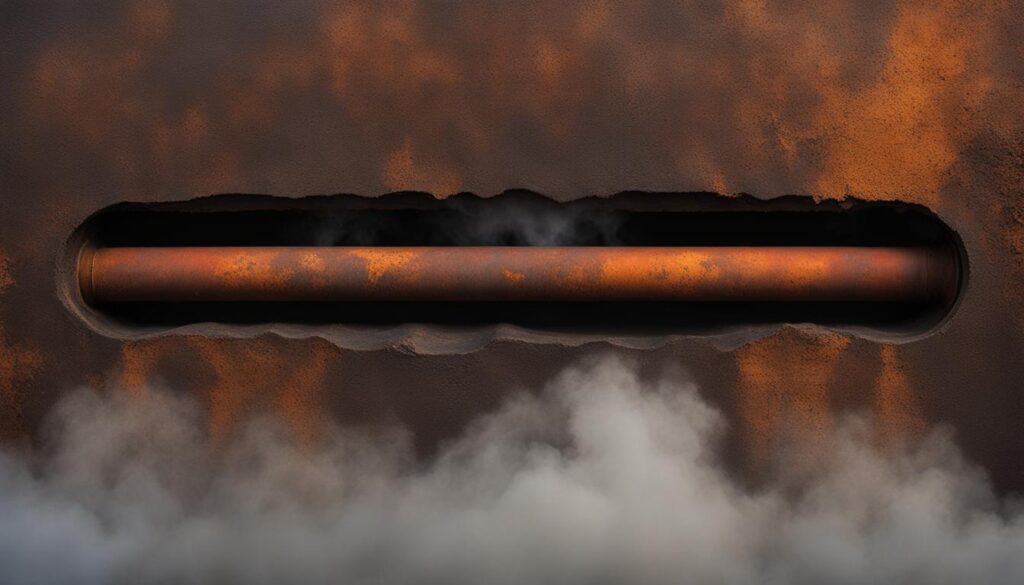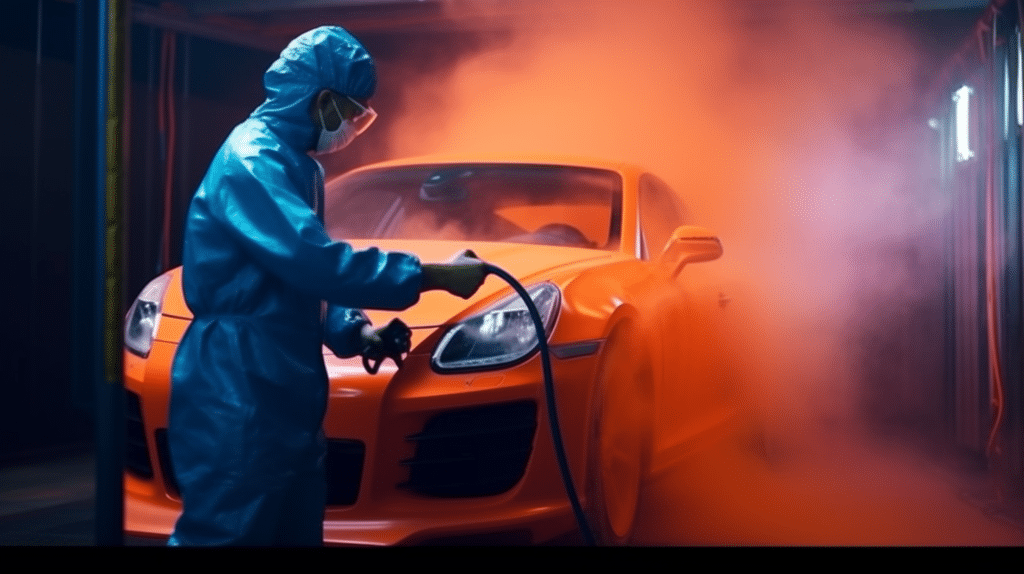The exhaust system of a car is crucial for its smooth and safe operation, as it controls emissions, manages noise levels, and improves fuel efficiency. However, there are several common problems that can occur with exhaust systems. These include blocked exhausts, leaks, clogged catalytic converters, leaking exhaust manifolds, rattling exhaust pipes, and broken mufflers. It’s important to diagnose these issues and take corrective measures to ensure the proper functioning of your exhaust system.
Key Takeaways:
- Common exhaust system problems can include blocked exhausts, leaks, clogged catalytic converters, leaking exhaust manifolds, rattling exhaust pipes, and broken mufflers.
- Signs of exhaust system trouble may include unfamiliar sounds, decreased engine performance, increased fuel consumption, smoke, hissing sounds, and visible signs of damage.
- Diagnosing and addressing these issues promptly can improve fuel efficiency, reduce emissions, and ensure a quieter and smoother driving experience.
- Regular maintenance and inspections play a crucial role in preventing further damage and expensive repairs to the exhaust system.
- By prioritizing exhaust system maintenance and repair, drivers can extend the lifespan of their vehicles and enjoy optimal performance.
Diagnosing Blocked Exhausts and Leaks
Blocked exhausts and leaks are common issues that can impact the performance and efficiency of your vehicle’s exhaust system. By understanding the signs of blockage and leaks, you can diagnose these problems early and take the necessary steps to address them.
Blocked Exhausts: Signs of Blockage
A blocked exhaust can occur due to the accumulation of dirt, rust, or debris in the exhaust pipe. This build-up restricts the flow of exhaust gases, leading to several noticeable signs of blockage:
- Unfamiliar sounds: Blocked exhausts may cause unusual noises, such as rattling or banging sounds, coming from the exhaust system.
- Decreased engine performance: Blockages can hinder the engine’s ability to expel exhaust gases, resulting in reduced power and overall performance.
- Decreased fuel efficiency: When the exhaust system is blocked, the engine has to work harder to push out exhaust gases, leading to increased fuel consumption.
To diagnose a blocked exhaust, start by visually inspecting the exhaust pipe for any signs of blockage, such as excessive soot or debris. If you suspect a blockage, it’s advisable to consult a professional mechanic who can help clear the exhaust pipe or recommend a replacement if necessary.
Leaks: Exhaust Pipe and Exhaust Manifold
Leaking exhausts can result from loose or worn-out exhaust pipes or cracks in the exhaust manifold. These leaks can create several potential issues:
- Smoke: If you notice smoke coming from the exhaust pipe, it may indicate a leak in the system.
- Hissing sound: A hissing noise may be heard when there is a leak, particularly when the engine is running.
To identify a leaking exhaust pipe or manifold, visually inspect the components for any signs of damage or cracks. Additionally, running your hand along the exhaust system may help you feel any air escaping through leaks. If you suspect a leak, it’s essential to have it repaired promptly to prevent further damage to the exhaust system and ensure optimal performance.
| Signs of Blockage | Signs of Leaks |
|---|---|
| Unfamiliar sounds (rattling, banging) | Smoke |
| Decreased engine performance | Hissing sound |
| Decreased fuel efficiency |
Troubleshooting Clogged Catalytic Converters and Leaking Exhaust Manifolds
When it comes to the proper functioning of a car’s exhaust system, two common issues that can arise are clogged catalytic converters and leaking exhaust manifolds. These problems can negatively impact engine performance, increase fuel consumption, and lead to other complications.
Signs of Clogged Catalytic Converters
If you suspect a clogged catalytic converter, it’s essential to be aware of the signs. A decrease in engine performance is often a clear indicator of this issue. You may notice a lack of power, sluggish acceleration, or difficulty maintaining speed. Additionally, a clogged catalytic converter can result in an increase in fuel consumption. You might find yourself making more frequent trips to the gas station than usual.
Addressing Leaking Exhaust Manifolds
Leaking exhaust manifolds can occur due to cracks or broken gaskets, which can lead to smoke emissions and hissing sounds. If you notice these signs, it’s crucial to address the issue promptly. Ignoring a leaking exhaust manifold can result in further damage to the engine and exhaust system, leading to more expensive repairs.
To address clogged catalytic converters and leaking exhaust manifolds, professional assistance might be necessary. A qualified mechanic can diagnose the problem accurately and recommend the appropriate course of action.

In some cases, the catalytic converter or exhaust manifold may need to be replaced. These components play a vital role in the efficient operation of the exhaust system. By ensuring their proper functioning, you can maintain your car’s performance, fuel efficiency, and reduce emissions, ultimately contributing to a smoother and more enjoyable driving experience.
Fixing Rattling Exhaust Pipes and Broken Mufflers
Experiencing a rattling exhaust pipe or a broken muffler can be a frustrating and concerning issue for car owners. Not only can it create an annoyingly loud noise while driving, but it can also indicate potential damage to your vehicle’s exhaust system. Addressing these problems promptly is essential to ensure the optimal performance and safety of your car.
When you notice a rattling sound coming from your car’s exhaust, it’s crucial to investigate the source of the problem. A loose or broken exhaust pipe can cause the rattling noise and even lead to visible signs of damage. Look for any visible signs of damage, such as a hole or crack in the exhaust pipe. If you detect any damage, it’s recommended to have the exhaust pipe tightened or replaced to eliminate the rattling and prevent further issues.
Similarly, a broken muffler can also result in loud noises and indicate a more significant problem. The muffler can develop holes or cracks, which can lead to smoke emission and an excessively loud exhaust noise. If you suspect a broken muffler, it’s best to have it inspected by a qualified mechanic. Depending on the extent of the damage, the muffler may need to be replaced to restore optimal functionality.
Fixing rattling exhaust pipes and broken mufflers requires the expertise of a professional. Attempting to repair these issues without proper knowledge and tools can potentially worsen the damage. Therefore, it’s advisable to consult a trusted mechanic who can accurately diagnose the problem and perform the necessary repairs.
Importance of Exhaust System Maintenance and Repair
Maintaining and repairing the exhaust system of your car is crucial for its overall performance and safety. Regular inspections play a vital role in detecting potential issues early on, helping to prevent further damage and costly repairs.
By addressing exhaust system problems promptly, you can experience various benefits. Firstly, it improves fuel efficiency, allowing you to get the most out of every drop of fuel. This not only saves you money at the pump but also reduces your carbon footprint by minimizing emissions.
In addition, a well-maintained exhaust system ensures a quieter and smoother driving experience. A faulty exhaust system can produce loud noises, leading to discomfort and disturbances for both you and other road users. By prioritizing exhaust system maintenance and repair, you can enjoy a more pleasant and peaceful drive.
Regular inspection and maintenance of your exhaust system can extend the lifespan of your vehicle. By identifying and addressing issues early on, you can prevent them from escalating into more significant problems that could potentially damage other engine components.
FAQ
What are some common problems that can occur with exhaust systems?
Common problems with exhaust systems include blocked exhausts, leaks, clogged catalytic converters, leaking exhaust manifolds, rattling exhaust pipes, and broken mufflers.
How can I diagnose a blocked exhaust?
A blocked exhaust can be diagnosed by checking for signs of blockage at the exhaust pipe, such as unfamiliar sounds, decreased engine performance, and decreased fuel efficiency.
What causes exhaust leaks?
Exhaust leaks can be caused by loose or worn-out exhaust pipes or cracks in the exhaust manifold, resulting in smoke and hissing sounds.
How do I fix a clogged catalytic converter?
To fix a clogged catalytic converter, the accumulation of dirt, soot, and debris needs to be cleared or the catalytic converter may need to be replaced. Signs of a clogged catalytic converter include decreased engine performance and increased fuel consumption.
What causes a leaking exhaust manifold?
Leaking exhaust manifolds can be caused by cracks or broken gaskets, resulting in smoke and hissing sounds.
How can I fix rattling exhaust pipes?
Rattling exhaust pipes can be fixed by tightening or replacing the exhaust pipe, as loose or broken pipes can cause visible signs of damage and rattling noises.
What should I do if my muffler is broken?
If your muffler is broken due to holes or cracks, it may need to be replaced to eliminate smoke and loud noises.
Why is exhaust system maintenance and repair important?
Regular exhaust system maintenance and repair can improve fuel efficiency, reduce emissions, ensure a quieter and smoother driving experience, and extend the lifespan of your vehicle.




